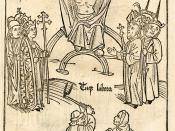In a time where people no longer could trust the ethical system of the Roman
Catholic Church there was much confusion and a great need for change. In that change
there also came a great attack on the Church that could truly be exemplified by men such
as Luther and Calvin. The resulting reform that the many years of change brought was a
new type of Christianity. What is so astonishing about the entire process of the
Reformation is how greatly it effected the nations of Europe, and how on the verge of
chaos people like the men mentioned above kept it together. All the factors that were
strung together can be best illustrated by the main powers in political, economic, and
theological issues who so desperately cried out for innovation. The issues of the
aforementioned factors caused the dissolution of the greatest power in Europe at the time,
and ultimately reduced it to a Europe who had no unification for the first time in
thousands of years.
The Reformation could have its earliest roots traced back to the days of Huss and
Wycliff who were the first people to speak out publicly against the practices of the
Roman Catholic Church. However, it was Martin Luther who in 1517 really gathered the
support of angry, fed-up citizens to establish Protestantism. Why Luther succeeded in
convincing the people when Huss and Wycliff didn't, was really based on the political
atmosphere of the time that surfaced across Western Europe. In the Medieval times, the
emperors of the Roman Catholic Church, which included but not exclusively held to Philip
I and Maximilian I, had asserted themselves as the secular rulers of Christianity across the
continent. That meant that as well as being head of the religious department they also
controlled the states...



Comments
There should be in-text citations as well as a works cited/bibliography section; this paper would be so much more powerful for it. Also, it helps to include these so that when others which to take only a quote from a paper, they can take it directly from the bibliography instead of just saying (qtd. in ---).
3 out of 3 people found this comment useful.